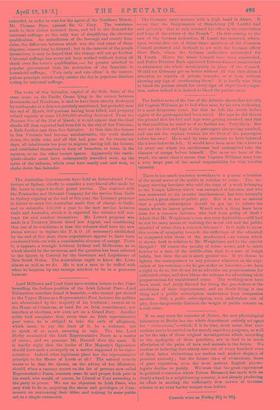Lord Milltown and Lord Gort have written letters to the
Times bewailing the forlorn position of the Irish Liberal Peer—Lord Palmerston somehow found it bearable,—who cannot get elected to the Upper House as a Representative Peer, because his politics are abominated by the majority of his brethren ; cannot sit in the House of Commons, at least for an Irish constituency, nor interfere at elections, nor even act on a Grand Jury. Another noble lord complains that, every time an Irish representative peer votes, he is obliged to take the oath of allegiance, which must, to say the least of it, be a nuisance, not to speak of so much swearing in vain. The late Lord Derby nominated the Irish Representative Peers as a matter of cours", and we presume Mr. Disraeli does the same. It is hardly right that the leader of Her Majesty's Opposition should have such a monopoly on a matter supposed to be repre- sentative. Indeed, what legitimate place has the representative principle in the House of Lords at all? The natural remedy seems to be that the Queen, an the advice of her Ministers, should, when a vacancy occurs on the list of persons now called Representative Peers, summon some fit and proper Irish peer in his stead, who would, of course, be Liberal or Tory according to the party in power. We see no objection to Irish Peers, who may wish to do so, acquiring the status and privileges of Com- moners on renouncing their titles, and retiring by some public act to a simple commoner.


































 Previous page
Previous page